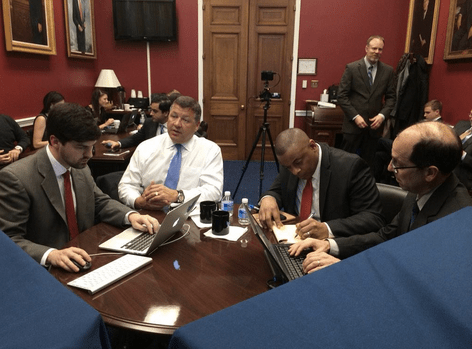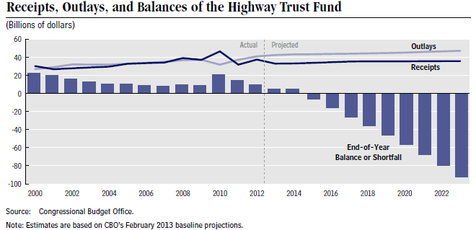Lawmakers in Washington are just beginning their latest attempt to craft the first long-term transportation bill in roughly a decade. The current bill expires in just a few months, on May 31, but in Congress that's an eternity. While it's a long way from go time, the contours of the debate are starting to become apparent.

Here's how things are shaping up.
The White House Transportation Proposal and Anthony Foxx's "Grow America Tour"
The Obama Administration has unveiled the broad strokes of a six-year transportation proposal, the "Grow America" plan, that would dramatically increase federal funding for transit and include key incentives to reform how state DOTs spend their billions.
Transportation Secretary Anthony set out on a four-day tour of some Southern states yesterday to promote the Grow America plan. Foxx has been enlisting local leaders to help build a push for reauthorization.
The Fight Over Transit Funding
Pushing in the opposite direction, bolstered by Koch brothers money, is the Tea Party wing of the GOP, which wants to end federal funding for anything that's not highways.
Last week, a group of rural Republicans raised the prospect of eliminating the portion of the Highway Trust Fund that supports transit. Since Ronald Reagan signed the policy into the law in 1983, 20 percent of federal gas tax revenue has gone toward the nation's rail and bus systems.
During the last round of transportation bill negotiations in 2012, some far-right members of Congress took a swing at this too, but they were ultimately unsuccessful, as urban and moderate Republicans opposed the idea. This time around, dismantling federal funding for transit doesn't have a real chance either, but the Koch brothers bloc will be a force in negotiations.
House Transportation and Infrastructure Committee Chairman Bill Shuster admitted to Roll Call that last time around, Republicans had "a revolt on their hands" when they tried to end transit funding. It seems that this time, Shuster is trying to rally his party around a more moderate proposal with a greater chance of passage.
Where the Money Might Come From

Congressman Dan Lipinski (D-Illinois) and Reid Ribble of (R-Wisconsin) have said they are collecting 300 signatures on a letter from their colleagues calling for a long-term transportation bill. "What the letter obviously dances around," reported Crain's Chicago, "is how to get the money."
As inflation and increasing fuel efficiency have eaten away at the federal gas tax (which hasn't been raised since 1993), the Highway Trust Fund -- America's main source of transportation funding -- has been slowly going broke. Since 2008, the federal government has poured $62 billion into bailing out the fund. It currently only generates about $34 billion a year, while federal transportation spending has been closer to $50 billion.
Raising the gas tax is the most obvious and logical solution -- but Congress and the White House aren't even discussing it. Instead, Foxx has been pushing a White House proposal to close a tax loophole on overseas business transactions, a plan he says would generate a one-time $2 trillion pot of money for infrastructure spending. Republicans panned the proposal as an unacceptable new tax when it was first unveiled. Senators Barbara Boxer and Rand Paul, meanwhile, were shopping around a similar but even more outlandish idea to generate a one-time revenue burst by letting corporations move overseas profits back to America at a reduced tax rate.
Amtrak
It looks like Amtrak may sail to an uncharacteristically drama-free funding extension. Last week the House T&I Committee passed a bill that would provide Amtrak with $1.7 billion over the next four fiscal years, a slight increase over current levels, according to Progressive Railroading. The most significant change is that profits from the Northeast Corridor, Amtrak's most profitable service, would be reinvested back in the route instead of absorbed by the whole system.
Shuster, who introduced the legislation, called it a "good reform bill that... forces Amtrak to operate like a true business." (Note: Federal law requires the nation's passenger rail service to maintain many unprofitable long-distance routes as a matter of national security, so expecting them to operate like a business is a little disingenuous.)
Not everyone was pleased with the proposal. Richard Harnish, executive director of the Midwest High Speed Rail Association, said in a statement the "piddling" amount would subject the agency to "five years of declining service when the system should be rapidly expanding."





